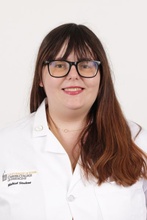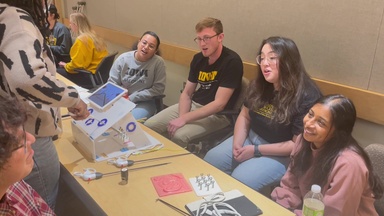First-generation medical students are an important part of a thriving physician workforce that represents people and patients from all backgrounds.
But the obstacles for these students are well known. Adjusting for all variables, first-generation college graduates are less likely to apply and be accepted to medical school than their continuing-generation peers. In 2023, just 11% of the total matriculants to medical school were first-generation college students.
One major barrier for these students is awareness. If someone didn’t know any doctors growing up, it can be difficult to imagine that such a long, challenging, and often expensive educational pathway is attainable or what careers in health care might be a good fit for them.

Holly Hemann, a second-year medical student from Des Moines, Iowa, knows what it’s like to navigate these questions. Hemann’s parents were both visual artists, and they did not have experience with the complex path to science careers like the ones Hemann was interested in.
“Growing up, I was low income. That’s a big part of my background," she says. “A lot of my upbringing is very consistent with other first-generation students.”
No one in Hemann’s family worked in health care. She loved math and science, so when she started college, she thought she would be a mathematician.
“I still love math. I love the logic of it and working through problems. But I didn’t really like what the actual career would look like—not working with people,” she says.
Seeing the connection between science, problem-solving, and working with people, Hemann applied to medical school right after college, but she was not accepted.
“Well, what do I do now?” she remembers thinking. “I was trying to figure out what else I could see myself doing, if not medicine.”
She tried a handful of other career paths, working as a high school chemistry teacher, a mental health counselor, and in psychology research.
“I just kept finding parts that I liked and parts that I didn’t,” Hemann says. “Those jobs were fun, and I liked doing them, but I just kept coming back to wanting to go to medical school. Eventually, I thought, ‘If all the things I like about these other careers are what medicine is, then that’s probably where I should be.’”
She went back to school and earned a master’s degree in medical science. When she reapplied to medical school, she was admitted.
Now, Hemann wants to make it a little easier for first-generation students like her to find their place in the health care world.
The power of CHOICES
The First Generation and Low Income in Medicine Association (FGLIMed) in the Carver College of Medicine was founded in 2022 to help students from similarly disadvantaged backgrounds connect, network, and support one another through medical school. When Holly joined in her first year of medical school, the group was looking for new community service and outreach opportunities that would align with their mission.
As a high school teacher, Hemann had connected with high school career-learning programs on behalf of her students, so she knew where to start.
“The Upward Bound program is one of several TRIO programs, which are federally funded educational programs,” she says. “Upward Bound helps low-income and first-gen high school students graduate high school and pursue secondary education.”
A major function of Upward Bound is giving students exposure to a variety of employers and job fields that can be achieved with a college degree.
“I knew from my connections with the Upward Bound program that they’re always looking for as many opportunities as possible for their students,” Hemann says. “They had had a lot of employers come talk to the students, but they had never had anyone from health care. It was just about figuring out what resources we could offer the students.”
Hemann partnered with Des Moines Area Community College Upward Bound to launch the first CHOICES (Creating Health care Opportunities, Inclusivity, and Career Exploration for Students) program as an outreach initiative of FGLIMed. So far, FGLIMed has worked with 139 students at eight Iowa high schools. By coordinating with departments across and outside of the Carver College of Medicine, they have been able to bring physicians, athletic trainers, dentists, dieticians, physician assistants, nurses, physical therapists, medical researchers, and other health professionals into classrooms in central and eastern Iowa.
“We arranged for people from all those different disciplines to do different hands-on workshops to show what their career is about,” Holly says. “The activities help students visualize themselves in that career and figure out what their skills and interests really align with."
For example, when CHOICES brought in medical students and surgeons, the high-schoolers tried out a surgery simulator and practiced basic exam skills with stethoscopes. The nurses who visited taught them about cardiopulmonary resuscitation (CPR).

A group of medical students sit across a table from two high school students during a surgery simulation activity
“It's always nice to see the students who don't want to leave because they're having a lot of fun,” Hemann says.
Students surveyed after CHOICES often report that the program introduced them to careers that they didn’t previously know existed but now were interested in learning more about, like music therapy, social work, and biomedical engineering, Hemann says.
“A lot of people will know that they want to do something in health care, but they think the only options are ‘doctor’ or ‘nurse,’” she says. “A big thing I wanted to do with this program is show people that there are so many different options within health care. There's something to fit everyone.”
The programs have been so popular that FGLIMed is getting inquiries from schools across Iowa.
“Unfortunately, I cannot go to every city in Iowa,” Hemann jokes.
Hemann has worked with some of these schools to bring the students onto the Carver College of Medicine campus for CHOICES—which also gives them a chance to tour the medical school and ask questions about the application process.
It continues to show me what I want to do with my life. CHOICES has been really grounding for me because I’m able to do something that feels actionable and immediately helpful.
--Second-year medical student Holly Hemann
“Since we've been doing this program now for over a year, there were some people who were seniors when we piloted it who have now come to the University of Iowa,” she says.
CHOICES’ success has been both personally and professionally fulfilling for Hemann, who says giving back to the community has supported her mental health in medical school.
“It continues to show me what I want to do with my life,” she says. “CHOICES has been really grounding for me because I’m able to do something that feels actionable and immediately helpful.”
Hemann is still deciding what specialty she’s interested in pursuing, but CHOICES has made her reconsider how her skills as an educator could be applied in her medical career. She is also a part of the college’s Teaching Distinction Track.
“Whether that continues to be through these pipeline programs with younger students or is in more of the graduate student realm, we'll see,” she says. “But I continue to see teaching being a part of my career going forward.”
For more information about CHOICES, contact fglimedchoices@gmail.com.